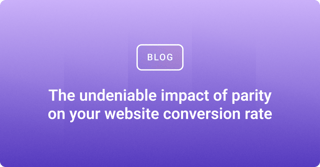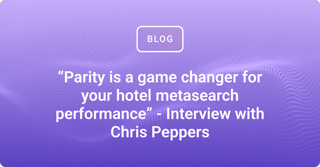Hotels need metasearch.
That's the message we took away from this year's Direct Booking Summit in Dallas. Google's determined push into travel is centered around its metasearch offering - Google Hotel Ads - and will see more and more hotel bookings swallowed up by the major advertisers unless hoteliers ensure they have a compelling presence on the platform.
Our audience in Dallas heard from TripAdvisor, Skyscanner, Remington Hotels, La Quinta and Koddi on where metasearch is headed as we move into 2019. You can watch our earlier panel discussion on the subject from the Direct Booking Summit: Europe here. This article wraps up our top learnings from the experts. Read on to find out how you can stay ahead of the pack.
Where Google goes, the industry follows
Like it or not, Google has an unparalleled influence over how the world searches for and books their travel. Back in June 2017, this influence got them into hot water with the European Commission when the company was fined 2.42 billion euro for giving its own comparison shopping ads 'an illegal advantage'. But Google Hotel Ads hasn't stopped growing, and Booking.com and Expedia haven't stopped channelling budget into the rapidly evolving channel.
"The opportunity on offer in the global travel industry at the moment is enormous," stated TripAdvisor's Adrian Hands on our panel. "The fact that Google is investing so heavily just shows what a massive opportunity there is."
"Google are getting more and more ubiquitous throughout the booking funnel," reiterated Remington's Jay Hubbs. "Being on that shelf is more important than being on any other shelf right now. We're changing the lens of how we look at Google. It's where the vast majority of our guests are starting their search journey, and it's where I need to make sure my touchpoints are optimized.
"I need to be participating in that auction for that customer."
While Google remain cagey about whether they'll ever move to a full-blown OTA model, it's clear that they're working to own as much of the online booking journey as possible. Hoteliers who tried metasearch when it was surrounded by hype a few years ago and then decided it wasn't for them need to see that the game has been changed: rather than an optional channel where only a subset of guests used to find their hotel, meta is becoming synonymous with the biggest search engine in the world. If you're not in that auction, you're handing over a booking to an OTA.
Meta on mobile is better
For years, meta on mobile has had a bad rep. The multi-tab experience - where a new window opens once a user clicks on a price - was not designed for the small screen, and conversion rates suffered as a result. That's all changing now, says Skyscanner's Gil Harel.
"We're seeing a shift in the way that people consume travel," Gil told delegates at the Direct Booking Summit. "We wanted to make sure that Skyscanner was providing a great user experience on mobile, rather than directing users to another site. Now we offer direct booking, where the advertiser actually has a 'storefront' on Skyscanner and the booking takes place on our site. We've just gone live with Hyatt, and IHG is next.
"Adding direct bookings led to a 50% uplift on mobile. It allows you to sell hotels to the consumer in a very easy way."
Skyscanner isn't alone in prioritising the mobile experience. As with all its products, Google Hotel Ads is a mobile-first platform designed to be used with the fast-evolving Trips app. While desktop meta is a great opportunity to attract traffic to your site, mobile meta is where you might want to experiment with bookings on Skyscanner or Book on Google. Indeed, while TripAdvisor's Instant Book on the whole didn't take off among hotels, Adrian Hands pointed out that the feature was particularly popular among mobile users.
Different platforms work better on different devices - and convert different users. A solid meta strategy takes this into account and adjusts bids accordingly.
Adopt a smart bidding strategy
Many hotels haven't experienced the return they expected from metasearch because they or their provider use a 'set it and forget it' approach. Static bids - where the advertiser adjusts their bid parameters maybe once or twice a year - often lead to a spike in metasearch traffic before a levelling off due to seasonality, changing audiences and evolutions in user behavior. Bid parameters that apply to guests from the UK in January will not apply to those same guests in June. Furthermore, bidding on metasearch without regard for your real-time parity situation means you can end up essentially advertising the fact that you're more expensive than an OTA.
"Our most sophisticated advertisers are saying 'this is the type of booking I want to come direct,' and then making sure they're bidding for those bookings on meta. There are always users that are going to book through OTAs - there's no need to push for 100% direct." That was the message from Koddi's Nicholas Ward on our metasearch panel.
"Each metasearch has its own advantages in terms of a specific customer base," continued Skyscanner's Gil Harel.
Recognizing those channel-by-channel differences is critical to a successful meta strategy. Spending indiscriminately on metasearch engines means wasting money acquiring traffic you have little chance of converting. If hotels are bidding on searches where they're being undercut, or if they are targeting guests who don't fit their ideal customer profile, then they could be wasting thousands.
Supercharge metasearch with Guest Acquisition
Triptease's new Guest Acquisition product offers a previously unseen level of performance in metasearch. Using advanced machine learning models to predict the potential value for every guest, bids are adjusted for each customer in real time. Find out more about Guest Acquisition in our recent blog post, or see how it works with the Direct Booking Platform on our product pages.
Lily is Lead Product Marketing Manager at Triptease. When she's not investigating the industry or spreading the word that #DirectIsBest, she enjoys music, cycling, and obscure radio quiz shows.








